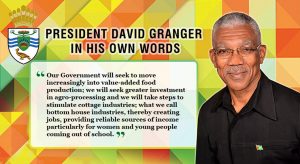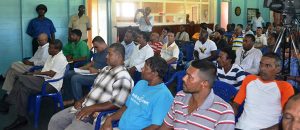-Government committed to ensuring that all stakeholders’ views are considered

In Guyana, sugar is one of the country’s primary revenue earners and, to date provides over 17,000 persons with employment. But the sugar industry has encountered its fair share of financial and other setbacks, requiring over $38 billion in annual bailouts since 2012, diverting tax revenues away from critical social and infrastructural development projects, even as the demand for sugar on the global market continues to diminish.
But this Administration has pledged to ensure that effective actions are taken to address the difficulties of the ailing industry and bring about the best solution for all stakeholders and the country as a whole.
Sugar production holds a long, productive history and has enjoyed much popularity beginning from its spread of cultivation and manufacture in the West Indies and tropical parts of the Americas in the 16th century, followed by greater improvements in production in the 17th through 19th centuries. But despite its prolific lifetime, the global sugar industry has, over the past years, fallen victim to several obstructions, including the introduction of alternative sweeteners, which led to a decline in demand for the commodity, among other factors.
As a result, the Caribbean, which was once a powerhouse sugar production region, experienced sizeable regression. This regression can be seen in the response taken by some Caribbean countries such as St. Kitts and Nevis, which closed its 300-year sugar industry in 2005 and Trinidad and Tobago, which began a major restructuring programme for its sugar industry in 2003.
In 2013, the Caribbean suffered another blow with the announcement by the European Union (EU) – the largest importer of sugar cane – that it would abolish its quota regime at the end of September 2017. The EU’s quota regime is a structure, which allows countries of the African, Caribbean, and Pacific Group of States (ACP), of which Guyana is a member, to sell sugar at two to three times the world market price. Without these preferences, sugar export revenues would decline significantly. This leaves sugar producing countries in the Caribbean in a further weakened position, as they would need to become more competitive by reducing costs, adding value to their sugar industries or diversifying into other crops.
 Following this announcement, the ACP, in a statement in April 2015, expressed its concerns for the impending quota abolition, which it believed was responsible for a sharp decline in global sugar prices. While urging that the EU extend the quota regime to the year 2020, the ACP said that it has warned the EU that the abolition of EU sugar production quotas in 2017 will lead to drastic price reductions and major market instability, which will seriously undermine the substantial investments in the reform and adaptation processes of their sugar industries. “The ACP sugar suppliers strongly believe that they would continue to need additional support to complete the much needed reform programmes already underway to allow them to genuinely attain a level of competitiveness in order to face the market challenges,” the organisation said in the statement.
Following this announcement, the ACP, in a statement in April 2015, expressed its concerns for the impending quota abolition, which it believed was responsible for a sharp decline in global sugar prices. While urging that the EU extend the quota regime to the year 2020, the ACP said that it has warned the EU that the abolition of EU sugar production quotas in 2017 will lead to drastic price reductions and major market instability, which will seriously undermine the substantial investments in the reform and adaptation processes of their sugar industries. “The ACP sugar suppliers strongly believe that they would continue to need additional support to complete the much needed reform programmes already underway to allow them to genuinely attain a level of competitiveness in order to face the market challenges,” the organisation said in the statement.
The removal of the quota systems and the price reductions in sugar will no doubt affect Guyana’s already ailing sugar industry. Sugar is responsible for a significant proportion of Guyana’s Gross Domestic Product (GDP) and overall agricultural production. But the country’s largest cultivator and producer of the commodity, the Guyana Sugar Corporation (GuySuCo), has been straddled with debt amounting to over $77 billion accumulated since the year 2000.
The sugar industry overall is in a dire state, with a production of just over 180,000 tonnes in 2016 in comparison to its expected 218,000 tonnes. GuySuCo workers were not paid any increases last year and there was no production bonus. Government also moved to close the Wales Estate on the West Bank of Demerara after an estimated $2B in losses was predicted for the year 2016.
Chairman of GuySuCo, Dr. Clive Thomas, reported earlier this year, that the corporation had lost 1.2 million man days (that is, the amount of work that can be done by one person in a day) since 2000 and that the cost for employment exceeds the revenue being earned by the company. Additionally, GuySuCo also owes billions of dollars to the Guyana Revenue Authority, the National Insurance Scheme as well as other creditors such as the Caribbean Development Bank. Coupled with poor labour turnout ranging from 52 percent in 2011 to 60 percent in 2016, which contributes to low production, the woes of Sugar Corporation continue to pile up. As a result of its financial state, GuySuCo has continually been bailed out by Government, receiving $4 billion in 2012, $5.4 billion in 2013, $6 billion in 2014, $12 billion in 2015 and $11 billion in 2016.

Since taking up Office, President David Granger has sought to remedy the ailing sugar industry, and has pledged to hold consultations with stakeholders on the way forward. On the January 20 Edition of The Public Interest, the President said that his administration would seek to have a consensus with regard to solutions for the sugar industry, which is why Government had embarked on talks with members of the Opposition and Civil Society. “We realise that sugar is one of the oldest industries in Guyana and many of our foreparents were brought here to cut sugar cane… We have some clear ideas on what has happened to sugar over the years. We know what has happened to Skeldon. That was a financial catastrophe. We know of the mismanagement, which has taken place and brought sugar to the present situation,” he said.
In 2015, a Commission of Inquiry was launched into GuySuCo, the findings of which were laid in the National Assembly. Coming out of the COI, it was established that Government would move to facilitate consultations with stakeholders in charting the way forward for the sugar corporation. Further, a Cabinet Sub-committee was appointed in 2016 to augment this process. The Sub-committee comprises Minister of State, Mr. Joseph Harmon; Minister of Agriculture, Mr. Noel Holder; Minister of Finance, Mr. Winston Jordan; and Minister of Natural Resources, Mr. Raphael Trotman.
In December last year, Government met with members of the Opposition, representatives of GuySuCo the Guyana Agricultural and Workers’ Union (GAWU) and the National Association of Agricultural, Commercial and Industrial Employees (NAACIE) began consultations on the future for the sugar industry. Leading the Government team, Minister Ramjattan said that the consultations were being held to ensure that the stakeholders’ best interests were considered.
“We made a major decision at the last Cabinet that we do have to have consultations and it will be extended now. The documentation that we gave them as to the options proposed to us by GuySuCo has been shared and they said that they needed time to study it and we agreed with that because they only got them this morning. They have asked for some further additional reports and studies as to what made GuySuCo come to the decision and to set out these options. I agree with them because they must have source documents and so it is important that they be part and parcel of the decision-making or at least know how we are thinking and that is important.
I am very pleased with the entirety of the meeting,” he said.
Minister of State, Joseph Harmon said that participants of the consultations were actively involved in the discussions and that decisions coming out of the consultations would help to ensure the future of the sugar industry. “I think they all understand what the position is. We shared documents with them and I believe that we are going to have some fruitful consultations going forward since the [sugar] industry is a very important industry. It is of national significance and so decisions that are made in that regard must take into consideration those factors,” he said.
Head of GAWU, Mr. Komal Chand said that the organisation and its members were pleased by the Government’s move to discuss the way forward. “We were assured by the Government delegation that what they have are mere proposals and the proposals are for discussions and it is not a case where decisions are made and we are going through an exercise and that is satisfactory to us. We recognise that consultations have taken place and we take fact that the proposals are not final. That is acceptable to us.”
Meanwhile, Mr. Clement Rohee, speaking on behalf of the Opposition, said that they were glad for the invitation to be part of the consultations as the livelihoods of thousands of Guyanese are affected.
 Later in February, the consultations wrapped up following a review of several documents including GuySuCo’s Business Plan for the period 2017-2025, Cost of Production for 2010-2025, Head Office component of Cost of Production 2010-2025, Breakdown of Government Support requirement for years 2017-2025. Proposals were also submitted by the unions and other stakeholders for consideration. Government expressed its intention to ensure that the best decision is made for the way forward.
Later in February, the consultations wrapped up following a review of several documents including GuySuCo’s Business Plan for the period 2017-2025, Cost of Production for 2010-2025, Head Office component of Cost of Production 2010-2025, Breakdown of Government Support requirement for years 2017-2025. Proposals were also submitted by the unions and other stakeholders for consideration. Government expressed its intention to ensure that the best decision is made for the way forward.
Even as Government considers options for the long-term viability of the sector anxiety among sugar workers continues to grow. Government’s closure of the Wales Estate sparked protest from the workers over their livelihoods. Earlier this month, Government met with the sugar workers to discuss several burning issues among which included the call from several workers to be given severance rather than to work at the Uitvlugt Estate. Minister Ramjattan, who headed the meeting, explained to the workers that Government would not be in a position to afford an additional $375 million in severance after having already paid $339 million in severance to a number of Wales Estate workers.
Even as Government continues to work on the situation at home, regional stakeholders are also working to seek solutions on the way forward for the Caribbean with the impending end of the EU quota regime. Guyana attended a two-day meeting organised by the Sugar Association of the Caribbean held in Jamaica in late March which facilitated an in-depth discussion of how the Caribbean sugar industry needs to adapt to the new market realities and the policy options.




.png)









